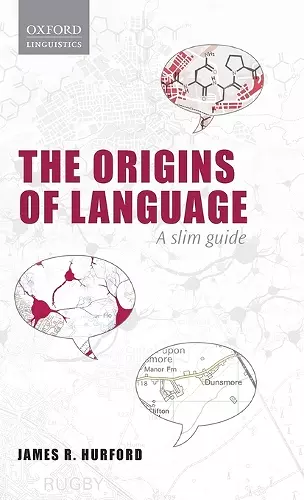Origins of Language
A Slim Guide
Format:Hardback
Publisher:Oxford University Press
Published:6th Mar '14
Currently unavailable, and unfortunately no date known when it will be back
This hardback is available in another edition too:
- Paperback£19.99(9780198701880)

Origins of Language: A Slim Guide offers a concise and accessible overview of what is known about the evolution of the human capacity for language. Non-human animals communicate in simple ways: they may be able to form simple concepts, to feel some limited empathy for others, to cooperate to some extent, and to engage in mind-reading. Human language, however, is characterized by its ability to efficiently express a wide range of subtle and complex meanings. After the first simple beginnings, human language underwent an explosion of complexity, leading to the very complicated systems of grammar and pronunciation found in modern languages. Jim Hurford looks at the very varied aspects of this evolution, covering human prehistory; the relation between instinct and learning; biology and culture; trust, altruism, and cooperation; animal thought; human and non-human vocal anatomy; the meanings and forms of the first words; and the growth of complex systems of grammar and pronunciation. Written by an internationally recognized expert in the field, it draws on a number of disciplines besides linguistics, including philosophy, neuroscience, genetics, and animal behaviour, and will appeal to a wide range of readers interested in language origins and evolution.
This short guide to modern empirical research on language evolution provides a breezy and readable introduction to the many issues involved in understanding how humans came to possess one of our most prized capacities: our ability to acquire and use language * Tecumseh Fitch, University of Vienna *
Jim Hurford has produced a work of stunning depth and breadth, expertly condensed in this slim guide. These are notoriously difficult questions: How did the capacity for language evolve in the deep history of our species? How do different languages evolve in the more recent histories of our societies? Hurford is one of the few scholars with the authority and interdisciplinary reach to give us compelling and plausible answers. The Origins of Language is a rare achievement, and highly recommended. * N. J. Enfield, Max Planck Institute, Nijmegen, and University of Sydney *
Clear-haded, authoritative and marvellously succint. * Chris Knight, Times Higher Education *
Hurford has written a delightful little book, an ideal point of entry into the range of complex issues facing anyone that wants to understand how human language evolved. Darwin himself would have cherished this guide. * Cedric Boeckx, ICREA/Universitat de Barcelona *
No one has thought more deeply about the evolution of the human language faculty than James Hurford, and no one writes about the topic more engagingly. In this book he explains and synthesizes the most important findings concerning language evolution from across a wide variety of scientific disciplines, including linguistics, biology, ethology, psychology, and cognitive science. His writing is always grounded in evidence-based argumentation, yet is informative and clear for the non-specialist reader. To introduce in such a short work all the major aspects of the evolution of language from the beginnings of a special human type of communication to the emergence of sound systems, through meaning to symbolic words to sentence structure is an impressive feat. To make it not only thorough but thoroughly readable is a real achievement. A lovely little book: great fun, cogent, and scientifically solid. * Maggie Tallerman, Newcastle University *
Hurford's survey can be thoroughly recommended. * Geoffrey Sampson, Language and Dialogue *
ISBN: 9780198701668
Dimensions: 225mm x 157mm x 18mm
Weight: 360g
182 pages